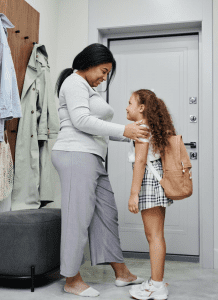
It’s OK to feel sad it’s almost time for your kids to return to school, and/or relieved it’s almost time for your kids to return to school.
As families prepare to return to school in the coming weeks, here are some tips for success for a smooth transition from summer break:
1. Ease anxiety through familiarity: Tour the school or meet the teacher, and schedule a play date with a classmate or plan a carpool in advance. Preparing your child for a new school, classroom, and friendships and calm their concerns.
2. Don’t force your child to cram for class! Last minute academic prep can make a child feel like they did not prepare enough for school over the summer, and can heighten their feelings of anxiety. To get back into the swing of learning, try educational opportunities they enjoy, like reading, playing a board game, or working on a puzzle together.
3. Reset for your school routine: Ease back into your child’s morning wakeups and evening bedtime routine during the week before the first day of school. This will make the process a smoother transition for your child when school starts, and ensure they are well rested for it.
4. Talk through expectations: Discuss classes or extra-curricular activities your child will look forward to with them, in order to generate excitement over the return to school. But talk with them about classes or experiences they may not enjoy, as well, like a challenging subject or riding the bus. Talking through difficult emotions together can help them prepare for the more difficult events, and practice expressing their feelings for open communication with you through the school year.
It is natural for a child to begin a new school year with increased anxiety or changes in appetite, sleep habits, irritability, or other behaviors. If you do not notice them return to their “normal” selves after they have adjusted to their new school routine, however, or their anxiety, sadness, or emotions are disrupting their day-to-day life, we recommend you seek additional support from a professional.
For more information on our Special Group Programs or individual treatment options for children and teens, contact us.




